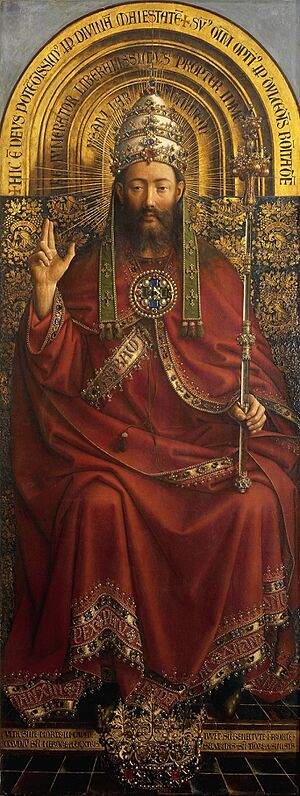Sacred king facts for kids

In many societies throughout history, a king's role was seen as very special, almost holy. This meant the king was not just a ruler, but also like a high priest or a judge. This idea is linked to theocracy, where religious leaders rule. However, a sacred king doesn't always rule only through religion. Instead, their position as king itself has a deep religious meaning.
Contents
What is a Sacred King?
A sacred king is a ruler whose power is believed to come from a divine or holy source. People often thought these kings had special connections to gods or spirits. They were seen as a link between their people and the divine world. This made their rule very important, not just for laws and order, but also for the well-being of the community.
Ancient Roots of Sacred Kingship
The idea of sacred kings goes back to ancient times all over the world. For example, in places like Java and sub-Saharan Africa, some kings were thought to be shamans. They were believed to have special powers, like being able to make it rain or ensure good harvests and good luck for their people.
Sometimes, a sacred king was even expected to suffer or take on the problems of their people. This showed how deeply connected they were to their community's fate.
Kings as Shepherds and Guides
From very early times, kings were often called "shepherds." For example, ancient Sumerian rulers in Mesopotamia, like Lugalbanda, were known by this term. The idea of a shepherd king shows that the ruler was expected to lead and protect their people. They also had the important job of making sure everyone had food and felt safe. This image highlights the king's role as a caring and powerful leader.
Sacred kings were also believed to have special wisdom or insight. Stories like those about Solomon or Gilgamesh show kings who were known for their great understanding or their ability to see the future through dreams.
Studying Sacred Kingship
The idea of sacred kingship became well-known because of a famous book called The Golden Bough. It was written by Sir James George Frazer between 1890 and 1915. This book explored many examples of sacred kings from different cultures. Frazer's work inspired many scholars to study how myths and rituals are connected to leadership.
Some groups, like those interested in Romanticism or Neopaganism, also study sacred kingship. They look at how these ancient ideas can relate to modern beliefs or spiritual practices.
Examples of Sacred Kings
Many different cultures have had sacred kings or leaders with similar roles. Here are a few examples:
- The Chakravartin in Indian thought was a righteous king who ruled fairly.
- Devaraja was a belief in Southeast Asia where kings were seen as divine.
- The Emperor of Japan was traditionally called Tennō, meaning "heavenly sovereign." People once believed the emperor was a living kami (a spirit or god).
- The Pharaohs of Ancient Egypt were considered divine rulers. Their names and titles showed their holy power.
- The King of Rome had religious duties, and later, the Pontifex Maximus (a high priest title) was even taken on by the papacy.
- The Son of Heaven was a title used by emperors in East Asia, showing their divine right to rule.
- The Obas, who were pre-colonial kings of the Yoruba people in Africa, were also seen as sacred rulers.
- In pre-Christian Scandinavia and England, kings often claimed to be descended from gods like Odin or Freyr. They sometimes served as priests for sacrifices.
Even into the Middle Ages, many monarchies continued the idea of sacred kingship. They promoted the belief that kings were chosen "by the Grace of God." This included:
- The Royal touch, where kings of England and France were believed to have supernatural healing powers.
- The Nemanjić dynasty in Serbia and the House of Árpád in Hungary were also seen as having a divine connection to their rule.
Sacred Kings in Stories
The idea of a sacred king has also appeared in many books and stories.
- Novels by Rosemary Sutcliff, like Sword at Sunset and The Mark of the Horse Lord, often show characters who take on the heavy responsibility of leadership and are willing to make personal sacrifices for their people.
- Katherine Kurtz also uses the idea of sacred kingship in her novel The Quest for Saint Camber.
Images for kids
See also
- Apotheosis, becoming divine
- Coronation, crowning a king
- Dying-and-rising god, a god who dies and is reborn
- Great King, a powerful ruler
- Mythological king, a king from myths
- Prince-Bishop, a ruler who is also a bishop
- Sceptre, a symbol of royal power

